Football
The Rundown: Everything Mike Gundy Said at His Pre-Kansas State News Conference
On K-State, the run game and more.
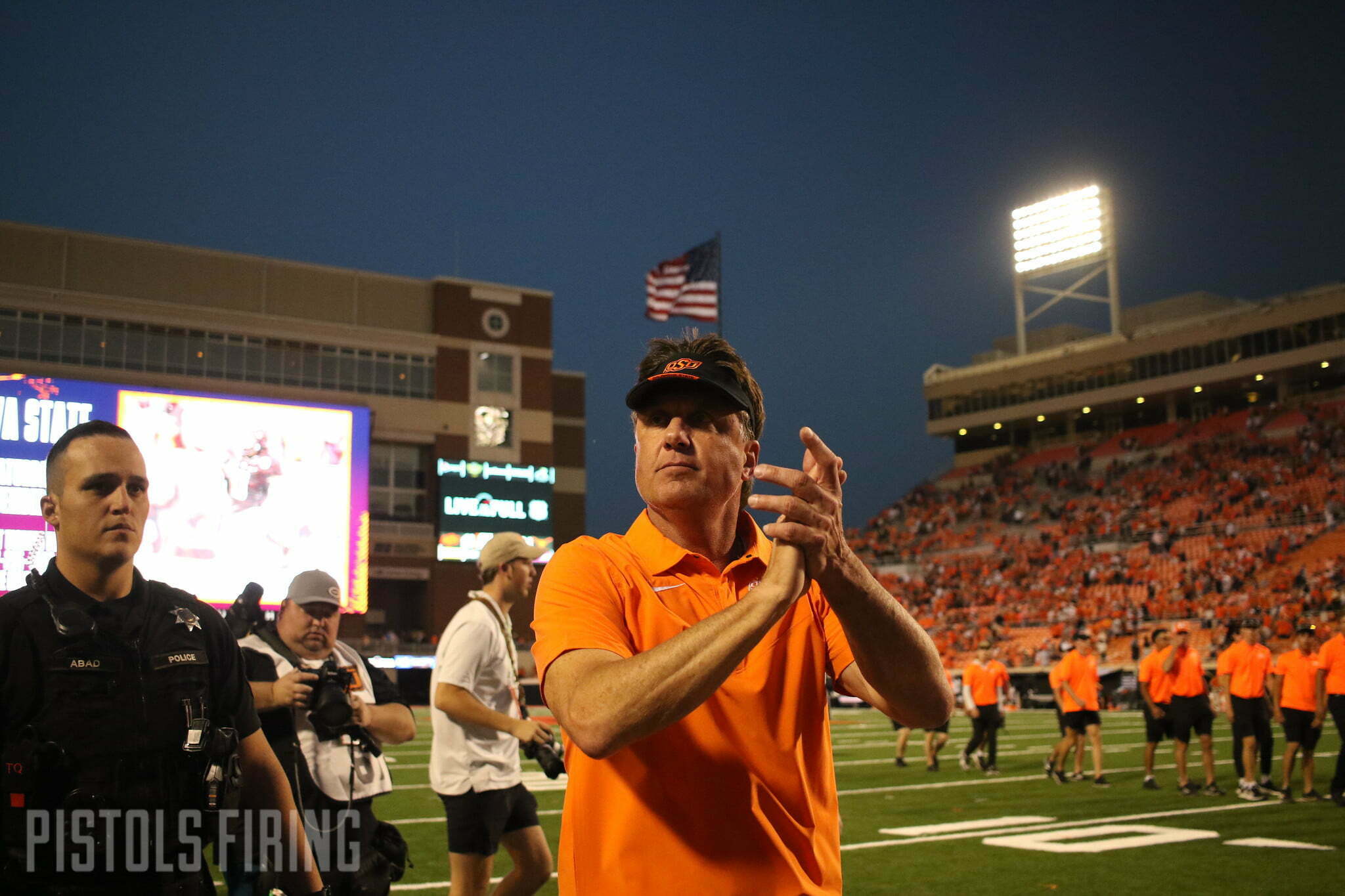
STILLWATER — After an impressive comeback victory against Texas this past weekend, the Cowboys are right back into another game with a Big 12 title contender.
Oklahoma State plays at Kansas State at 2:30 p.m. Saturday. Mike Gundy held his weekly media luncheon Monday. Here is what he said.
Opening statement
“Okay, we’re a little behind today with our work, so we can go right to questions, that way I get everyone’s questions answered and I can get back to where I was.”
On whether film review showed anything with the struggles in the run game
“Well, we were better. We were 4.3 (yards per carry) on our running back runs. So we were actually better in this game than we’ve been all year. In comparison of who were are, who we were, who they are in that game, it was better.”
On stopping the run
“There’s two ways to look at that. We got out of position. We either had a blown call of a miscommunication on three of the big plays. That’s the good news, meaning that I’d like to think that if we had the right call, or the communication was better, we could have limited, maybe not had, whatever 50 to 80 yards, maybe in the first half. Bad news is we didn’t get it communicated right. Good news is we should be able to fix that.”
On importance of stopping the run against Kansas State
“It’s the same. The game hasn’t changed much. You know, unless you’re playing Mike Leach, you got to stop the run, you got to run the ball effectively. That’s pretty much everybody. I’m guessing that’s what other teams do. That’s what we try to get accomplished. Texas was trying to do that and we were trying to do the same to them.”
On the adjustments Oklahoma State made defensively against Texas’ counter runs and facing the same style against Kansas State
“Yeah so there’s two things. First, is that we played it differently technique-wise in the second half than we did in the first half. And so we predicted inaccurately how we could effectively stop the counter. We figured out it wasn’t working like everybody else. We changed the technique in the way we were defending it for the second half. Kansas State is a big pull team. They like to block down a pull powers, counters a lot of things with quarterback reads zone. So in my opinion, they don’t run a play that is just a run. It’s got a quarterback read on it as well. Different kinds of counter, a little bit, some different sets and stuff but overall kind of the same concept.”
On the challenge of not knowing who Kansas State’s starting quarterback will be
“(Adrian) Martinez will play. I called up there today and they said he would play. The big joke around the office is I’ve done this for so long, I can generally predict injuries pretty well, our guys and the other teams. From what I saw, it looks like he’ll play. Looks like he had something, felt pretty good, went out and tried to play, it didn’t really feel right, took himself out. Six days rest, I’d say he’d be the starter. But to answer your question to be fair, we have to prepare for him.”
On whether he has a health report on his own players
“I don’t even ask anymore. I just mentioned, I said, ‘You guys let me know when we have less than five linemen. Then we have to start making some real adjustments.”
On John Paul Richardson coming back and guys being resilient
“Guys are in and out. We’re very, very, very cautious with the head injuries. So we had three calls from up here that said, ‘We need to check people out.’ And that’s how that takes place.”
On toughness of John Paul Richardson
“I mean, I started watching John Paul when he was a junior and saw tape. And then did a little research on him. Some kids are cut different than others, right? I mean, he’s been around it all his life. He’s been a gym rat. Likes to play the game. The physicality side of it and or what could happen doesn’t concern him. It’s really hard to play this game nowadays if you don’t play it that way. And he just plays and worries about the rest of it later.”
On John Paul Richardson being compared to Dillon Stoner
“A lot of similarities, very athletic. Dillon played a lot of position in high school. [Richardson] played quarterback, played a little running back at times. Played receiver. Toughness, I’d say there’s quite a few similarities, you’re right.”
On if he knew how good of a pass catcher John Paul Richardson was despite a limited amount of experience as a receiver in high school
“Yes. We knew that from his summer stuff.”
On Collin Clay’s development
“Just slowly, but surely. Those guys, y’all ask me about them in August and in September and they just kind of come on slow. You know, they’re just, young people are more tentative now than they ever were before because they get more information. Years ago when we played, nobody really knew how hurt you were. We didn’t do MRIs. These have a lot of information and so they just get a little tentative then they kind of work through it.”
On Jabbar Muhammad starting at safety
“I mean, his effort was good and he played hard, but it’s new for him. So there’s times that it was difficult for him to figure out what was going on. That’s where we’re at. You got to put somebody out there and we have to try to mix and match and do the best we can based on availability.
“Against those guys, they have tremendous speed and so you tend to want to put more cover guys on the field just to defend the deepest throws that they would have. And so, we felt like that his ability, and he’s a very intelligent player, but it’s still different. And so did he play well? Yes. Was there exposure to being inexperienced at that position? Yes.”
On whether Stephon Johnson Jr. and Ollie Gordon have ‘grown up’
“I would say [Johnson] exceeded my expectations of the way he would play in that particular situation. The moment didn’t get too big for him. That doesn’t mean he’s arrived yet. He has to do it multiple times continuously and consistently. And [Gordon] has been fine. I mean, he plays good and competes and goes out and plays on special teams. You know, he got lit up down there at Waco and fumbled and kind of got that out of the system. It’s not too big for him either. So you don’t want to hang your hat on many of them doing it but they’re doing pretty good.”
On whether success of young receivers comes from experience of Spencer Sanders or something else
“They’re getting way more reps at this stage in their career by default right now, because we’re beat up at that position and other guys have to play. So, [Stephon Johnson Jr.] played better than I thought he would in that game. I thought he would play okay, but he made a lot of plays. If you were watching the game and you lived on the east coast, you would not have thought he was a freshman. So he’s coming along. Unfortunately, we’ve had to throw those guys in the fire. He should be playing like eight or 10 plays a game right now. But we don’t have that luxury. So they’re learning on the run would be the best answer to that question.”
On whether Jaden Nixon earned more carries with his performance:
“We got him another shoe and taught him actually how to tie it. But you guys asked me last week and I told you that he would play a little more. He brings a little different dimension. We know what [Dominic Richardson] is gonna do. And then he brings a little bit different running style. And so he’s maturing, he’s growing up. We need him to get eight or 10 carries a game, because he plays on a lot of special teams, and we can throw him the ball. He does a good job. He didn’t at TCU, but otherwise he catches the ball pretty good.”
On Jaden Nixon’s pass attempt
“It was awful. He can’t throw a lick. He throws okay, but not as good as some of the other guys we have.”
On the culture at Oklahoma State and whether it has changed over the years
“So the the core of it, the basic principles have stayed the same. And, as I have gone through this a lot of years, I learned I didn’t really know I just accidentally never changed the core. And then made tons of mistakes and then corrected them. And then we developed a culture that takes a long time to instill in the players. And it’s even a little more tricky nowadays because social media has changed the perception of everybody, all of us in this room and everybody in that building, and the way people see people, the way people see themselves and so on so and forth. For that, we have to make more adjustments, but I have been very fortunate that most of the people that are in that building with me have been with me a long time.
“So this thing runs itself, the culture runs itself. I don’t really do much anymore. I just kind of stay out of the way and try to govern the main people. And there’s not any way in the world we could have won that game if we didn’t have that culture that we have here, because in most cases when you’re looking out there with the personnel we used at times they’re gonna panic. The coaches panic, then players panic, because they look out there and they’re like, ‘Okay, you have [Talyn Shettron] on the field. You have [Cam Smith] on the field, you have [Stephon Johnson Jr.] on the field. You have six on the field on both sides of the ball. We have guys on the field that shouldn’t even be lined up playing, much less against Texas. And so the coaches do a good job of the one thing I ask him to do, be patient have poise and teach and coach and correct. I don’t want screamers. I don’t like yellers. I don’t like guys that are running out of control. You know, your veins are popping out of your head, because then the kids panic. That’s the only thing I ask them to do and they do a good job. I don’t do anything in the games. I just stay away from everybody and let them do their jobs. If they ask me to go for it on fourth down, I usually say no. Every once in a while I say yes. That pretty much wraps it up for me.”
On whether Oklahoma State still has the ‘blue-collar attitude’ from previous teams
“You know, I went back and looked at some games from ’09, ’10, ’11, ’12, even up until the [Clint] Chelf year, ’13. I went back a week or so ago and looked at some of those games and just watched us and we were much more blue-collar than. We were tough. We would knock you on your ass and we get up and do it again and we were physical. Now we weren’t as effective throwing the ball, except when [Brandon] Weeden was here. Those other years were very average passing the ball, but we were tough. And then we got that back again the Chelf years when we were rushing the ball and we were tough, the JW [Walsh] years. We’re not that physically tough now, but we’re a different style of offense. It’s not like we’re soft, but we have to get that edge back in this offense in order for us to continue to be that way. And we’re working at it. We’ve just had some inconsistency up front health-wise, and then a little bit on the perimeter that’s kept us from getting back to where we really need to be, where we’re really blue-collar and physically tough, which we can be in the style offense we have. And then what that’ll do, that forces a defense to be tough. Because then they’re gonna get their butt kicked in practice if they don’t toughen up. That’s ultimately what the goal is, in my opinion, because it’s still a tough man’s game. The toughest teams mentally or physically, if things are equal, usually win in most cases in this game.”
On a Barry Switzer story
“Y’all heard the one when they went for fourth down against Nebraska? Did I tell you that story? It was the Billy Sim’s era. Have I not told y’all that one? I got this secondhand. I didn’t get it from Coach Switzer, but it’s secondhand. Galen Hall was the coordinator, right? They were going for a fourth down and Switzer clicked on the headphones, which he rarely did, and said — whatever he called him, Galen or Coach Hall — he said, ‘I understand we’re going for this, it’s 4th-and-1 or 2.’ He said, ‘I don’t care what play you run. I just want to make sure Billy Sims has the football.’ That was one of my favorite lines with him. I don’t know if that’s true. That’s what I was told. It’s probably a good call. Anyway, he got four yards.”
On coaching making a difference
“Coaching, in my opinion, at this level is more challenging now and more important than it ever has been in dealing with personalities, coaches. ‘How much money am I making? How long is my contract?’ NIL, ‘Why am I not playing? My parents said I need to go in the portal? How come I don’t have more NIL money? It’s a big challenge now. It’s almost like being a general manager of an NFL team, would be my guess, because you’re managing a lot of things and not a lot of football. That’s what’s different nowadays, in my opinion. Just from an outside looking in, I see inconsistencies and inexperience and things that can contribute to havoc based on all the different moving parts if you can’t try to keep them all together at once. That’s just my opinion.
“This stuff out here [on the field] is the easy stuff.”
On penalties being 14-0 on Satuday
“That’s your discipline in a daily basis to get to that point in practice. We referee our own practices in teams, and then we run the offense or the defense for every penalty they get at the end of the day in the spring and in August — we don’t do it during the season because we don’t have the legs left — to try to create some accountability and some discipline. And that’s the Coach (Bill) Snyder theory, right? It’s the penalty yards and the special teams yards that people don’t know about. I ended up beating you buy two points because I had 80 more yards than you did in those two areas.’ That’s what I learned from him, which I’ve said from Day 1. I’m guessing he won a lot of games because he was disciplined.”
On how much of the discipline comes from the culture
“It all turns full circle. The best example I give when I talk to the staff is when you’re raising children, if you let them get away with anything at any given time, like my third one, he got away with everything because I’m tired. Honestly, I’m just tired. I mean, he comes in a little late, ‘Ah, that’s OK. Whatever.’ If it doesn’t have to do with respect then I waver a little bit, so he hadn’t been raised as structured as the other two. It’s the same thing with the players. Any little thing we let them get away with, we turn around next week and it’s gonna be worse. It’s a full-time job to keep 140 of them accountable, but then also understand there’s personalities we’re dealing with and nobody is the same. I think coaches for years try to coach everybody and treat them the same. None of us are the same. None of us in this room are the same. And that’s the adjustment that has to be made, in my opinion, nowadays is: who are they? Where do they come from? What’s their makeup? How do we fix this and make it better and it all fall into our culture? That’s the real challenge. It’s a full-time job.”
On what he thinks when he hears Kansas State
“Well, I think of Coach Snyder. But, it’s the discipline and the simplicity and the toughness and play-hard that he created that has carried them through it. You see a lot of it on their teams now, that he was able to create. I used to go to watch Coach (Eddie) Sutton in practice in basketball. And he coached this defense and he coached these certain things, and then they were really good at it and they held them accountable for that. And that’s what they did. It’s all the same. It’s full circle.”
On Kendal Daniels
“You know, he made his mistakes in this game, but you can see where we need to keep patting him and telling him to keep going, atta boy, get back in there because he’s gonna do things that are going to wow us before it’s all said and done, if he stays humble and he stays focused and he understands the concept. And I think he will, but he’ll make his mistakes. But he’s also doing things where you’re like, ‘Ooo, that’s pretty good.'”
On Daniels redshirtting last year
“Well, he developed in the weight room, and he started to learn our culture. And he’s come in and adapted in our culture really fast. He’s very eager to learn. He’s humble. He’s unselfish. So, that growing that he went through, because he came from a smaller area, it’s a little bigger adjustment. He’s now learning and he’s making transition to the field. Now he’s trying to play to the speed of the game. He’s getting a little bit better, but he was fortunate that he didn’t have to get on the field last year with (Tanner) McCalister and (Kolby) Peel and (Jarrick) Bernard, all those guys that were here. He didn’t have to get out there because he was not ready last year.”
On Sean Michael Flanagan
“He’s awesome. He’s a culture guy. He’s accountable. He’s disciplined. He’s going to be the right place. We can trust him on special teams. He’s ‘Yes, sire, no, sir.’ He’s going to do everything we asked him to do.”
On special teams mistakes against Texas
“The punt block is we blocked the wrong guy. One guy tried to do another guy’s job, and that’s what happened. And when you play them, you’re more vulnerable because they’re all fast. A lot of times, if that would happen before, it still wouldn’t have gotten blocked, but the mistakes against them are going to glare on special teams. Their returners are really good. We missed a couple tackles. When you play them, you’re always just kind of holding on, on special teams. So, a couple of (missed) assignments. Mainly, they’re all just pretty fast.”
On Brennan Presley wanting to make up for the alleged muffed punt
“He came back on the kick return and ran it back to the 50 or whatever. He’s gonna do that. I mean, it eats on him, so you just tell him, ‘Hey, let’s keep rolling. It is what it is,’ and fix it.”
On what they’ll do if they don’t have Thomas Harper or Jason Taylor on Saturday
“We’ll have to have that discussion in the morning. I just walked out of there, and they’re doing some other stuff. We should know more by 11 o’clock tomorrow, and then we’ll have to try to, I’m not sure, we’ll have to try to decide what to do at corner and safety. There will be some young guys in the game, I’ll tell you that.”
On how OSU’s corners played Saturday
“Yeah, they did pretty good. I just watched the first half again with them, and then when the first half was over, I said, ‘I gotta go.’ They want me to watch the second half. I said, ‘I’ve seen enough. I’m out.’ They played pretty good. Honestly, they did. There’s some things they need to do better, but it wasn’t bad.”
On Tom Hutton getting punts off quickly when Texas brought a rush
“Yeah, so he was at 1.62 [seconds] on that. On, 1.62 you can almost not block anybody and the punt is gonna get off. He knows that he needs to be in under 1.7 in that particular time. The same thing we did at Baylor, same concept. We didn’t use our tight punt because I was concerned about their returner. So we went ahead and spread out and ran guys down the field because I was concerned about being in a tighter punt, which is safer protection but you can’t get out and cover as well. It doesn’t take much for him if he gets an open seam. So, we went to a regular punt formation and just told him he needed to get it off in less than 1.7. And he’s good about that.”
On Mason Cobb
“Cobb’s playing good. Cobb makes a lot of plays. He has the ability to make unorthodox plays, which is good. You can’t coach those things. He still does some things that he won’t do next year at this time. He’s young, but he’s a good football player. He’s tough. He’s been a good leader for us. He doesn’t run his mouth. He just plays, and he’s getting better each game.”
On Kansas State’s defensive line
“They’re good players. They’re tough and gritty. They’re a three-down team, basically. Their inside guys are going to be flat back, trying to push you back. They have good edge guys who are pretty active on the outside. I think they’re well-coached. I studied them quite a bit yesterday, and just out of curiosity pulled up the defense coordinator [Joe Klanderman], kind of do a little research on him, and he’s been with [Chris Klieman] a long time. He was with him at the other school. Then he came down and flipped from a four to a three-down, which is not an easy transition. He’s done a good job with it. And those edge guys will get some push. They’ll get around the corner. [Felix Anudike-Uzomah], he’s got really good hands, and he gets the tackle’s hands off, dips his shoulder and gets around the corner. We have to work hard and not let them get pressure in a three-man rush. Becomes a numbers game real quick. So, hopefully we can protect a little bit. If they’re going to be in a lot of three-down front.”
On Trace Ford
“He’s pretty effective. He showed up a lot. He was active. He played within himself. Sometimes Trace, you know, I call him the energizer bunny, bouncing around, but he played within himself. When he’s focused and playing within himself, because he’s very athletic and he’s active and he’s strong, he can be difficult to block because of the nature that he brings. He had a good game. They were big on the perimeter. They’re tough to deal with. Both those tackles are going to be first round picks, in my opinion. So that’s an issue there. … Trace handled it all pretty well. It was good. I think he only had 42 plays, but that’s about what he needs, now that I think of it. Forty to 50 at the max, but he did play well.”
On Trace Ford getting into opponent’s heads
“Because he’s unorthodox in what he does, he kind of messes with you a little bit, I would think. And Trace is a very emotional player. If they hold him a couple times and they don’t call it, he’s gonna tell the referee. He’s telling him in the balls being snapped over here. ‘Trace, we need a five-technique.’ He’s trying to explain to him the guy was hooking him. I said, ‘He did hook you, but they didn’t call it.’ He’s a little unorthodox, but he’s getting better and better and gaining confidence.”
On how much Kansas State’s gameday atmosphere has improved
“Stillwater, what you saw the other night, and then Manhattan and then Iowa State, it’s full, the crowd, they do a good job with their students. The atmosphere, it’s a great college environment. Back then they had the old turf field and the painted Wildcat in the middle that would like rip your skin off. It stayed that way for all four of my years. There was nobody at those games. They’ve made as big a transition in college football as anybody, in my opinion, from where it was from probably in the mid-90s. It was still that way. Coach Snyder came in in ’89, so I don’t think they got going up there until probably at least ’93 or ’94 or ’95 before anybody started showing up probably. That transition has been big. Been great for our conference. Let’s put it that way.”
On him getting upset with the band at Kansas State for playing too long
“I’m glad you brought that up. I need to check on that. We were going down that way, the bands out there on the field, and we can’t hear, the band. The rule is when the quarterback addresses the formation, you have to stop, and the band kept playing and we jumped offsides. I need to make sure that doesn’t happen. I forgot about that.”
On something similar happening in Waco this season
“I was heading that direction. Did you see me going down there? We were inside the 5 and they were playing. We were addressing the ball. Those are costly penalties because first-and-goal on the 4 is a different than first-and-goal on the 9 from a play-calling standpoint. But they stopped. They stopped.”

-
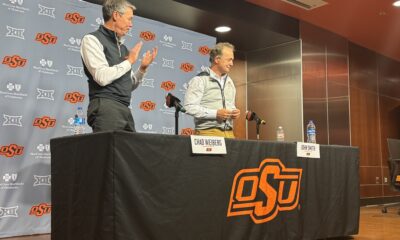
 Wrestling4 days ago
Wrestling4 days agoThe Top 5 Quotes from John Smith’s Retirement News Conference
-
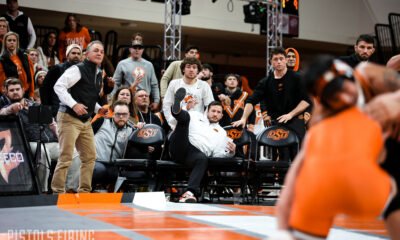
 Wrestling2 days ago
Wrestling2 days agoOSU Wrestling: How John Smith Started a Tradition of Late-Night Workouts For Cowboys Seeking World Glory
-
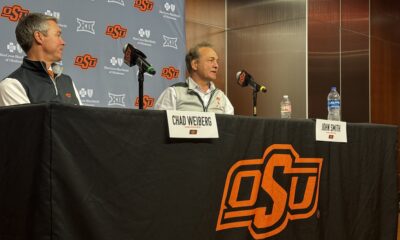
 Wrestling4 days ago
Wrestling4 days agoOSU Wrestling: The Impact John Smith Had on His Final Boss, Chad Weiberg
-
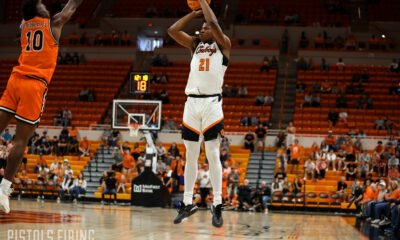
 Hoops4 days ago
Hoops4 days agoJustin McBride Enters Transfer Portal






